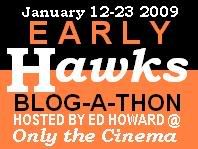Film Studies For Free was so inspired by David Bordwell's great recent post (Ashes to Ashes (Redux)) on Kar Wai Wong/Wong Kar-wai's Ashes of Time Redux (2008) (also see Bordwell's Years of being obscure), and so (eternally) grateful to Faye Wong for lending her iconic classiness to FSFF's upper regions, that its festive gift to its readers this year is some extensive, scholarly, Wong Kar-wai linkage - see below. Oh and, as a little extra stocking-filler, do please check out the wonderful new issue of World Picture Journal on 'the obvious':
Derek Attridge and Henry Staten, Reading for the Obvious: A Conversation; Scott Durham, "The Center of the World Everywhere": Bamako and the Scene of the Political'; Rosalind Galt, The Obviousness of Cinema; Sandra Gibson + Luis Recoder Cinema/Film; Christian Keathley, Otto Preminger and the Surface of Cinema' David Farrell Krell, The School for Stupefaction; Scott Krzych, Kino Ex Nihilo; Ernesto Laclau in conversation with Brian Price and Meghan Sutherland, Not a Ground but a Horizon; Sam Lipsyte, A Pimple on the Ass of Drew Barrymore Speaks; Karen Pinkus, Nothing from Nothing: Alchemy and the Economic Crisis; Angelo Restivo, The Obvious: Three Reminiscences; Stephen G. Rhodes, Interregnum Reanimated: The Living Cemetery; Jeffrey Sconce, Circuit City Unplugged.Warm seasons greetings to every one of FSFF's readers, many thanks for a fun first six months of blogging-life, and see you all again after a short break!
- Acquarello on Wong Kar-wai at Strictly Film School
- Matt Bautch, 'The Cultural Aesthetic of Wong Kar-wai', Latent Image 2003
- Felicia Chan, 'In Search of a Comparative Poetics: Cultural Translatability in Transnational Chinese Cinemas', PhD E-thesis, Nottingham University 2007, (chapter 3 - p. 147-201 - treats Wong Kar-wai)
- Ethel Chong, 'In the Mood for Love: Urban Alienation in Wong Kar Wai’s Films', Kinema Spring 2003
- Jeremy Cohen, 'Lonely Hearts: Wong Kar-Wai's Obscure Objects of Desire', Eye Candy Winter 2006
- Christopher Doyle & Wong Kar-wai interview for Interview Magazine on Ashes Redux
- Wendy Gan, "0.01cm: Affectivity and Urban Space in Chungking Express." Scope: An Online Journal of Film Studies, November 2003
- John Christopher Hamm, 'Review of Wong Kar-Wai's Ashes of Time by Wimal Dissanayake', MCLC Resource Publication, October 2005
- Ian Johnston, 'Unhappy Together: Wong Kar-Wai's 2046', Bright Lights Film Journal, vol. 47, February 2005
- Kent Jones, "Of love and the city." Film Comment, Jan/Feb 2001. Vol. 37, Issue 1; p. 22
- Daniel Kälberer, 'Reference Literature on Wong Kar-wai', Film Bibliography 2006
- Anthony Leong, 'Meditations on Loss: A Framework for the Films of Wong Kar Wai', Asian Cult Cinema 1999
- Toh Hai Leong, 'Wong Kar-wai: Time, Memory, Identity', Kinema Spring 1995
- Trish Maunder, 'Interview with Tony Leung', Senses of Cinema 2001
- Andrew O’Hehir, 'Wong Kar-wai's blueberry-pie America', Salon.com 2008
- Robert M Payne, 'Ways of seeing wild: the cinema of Wong Kar-Wai', Jump Cut 44, 2001, text version HERE
- Effie Rassos, 'Everyday Narratives: Reconsidering Filmic Temporality and Spectatorial Affect Through the Quotidian,' PhD E-thesis, University of New South Wales, 2005
- Tony Rayns, 'The Innovators 1990-2000: Charisma Express', Sight and Sound January 2000
- Quentin Tarantino on Chungking Express on YouTube
- Stephen Teo, 'Wong Kar-wai's In the Mood for Love: Like a Ritual in Transfigured Time', Senses of Cinema 2001
- Stephen Teo, '2046: A Matter of Time, a Labour of Love', Senses of Cinema 2005
- Stephen Teo, 'Local and Global identity: Whither Hong Kong Cinema?' Senses of Cinema 2007
- Fiona A. Villella (symposium ed.), 'The Cinema of Wong Kar-wai - A 'Writing Game', Senses of Cinema 2001 (entries on Backside; Blue; Creation; Dali-esque Time' Desire; Emotion; Look; Love; Possibility; Repetition; Space; Third-World; Time; Wrongheaded)
- Elizabeth Wright, 'Profile of director Wong Kar-wai', Senses of Cinema 2002
Miscellaneous:
- Wong Kar-Wai A fan site for the Hong Kong cult director presenting news, a biography, filmography, photos, and links.
- Chasing The Metaphysical Express: A Wong Kar-Wai Fansite A fan site featuring Wong Kar-Wai, reviews, and images.
- Wong Kar-Wai Facebook The official Facebook Page of Wong Kar-Wai.
- Wong Kar Wai on YouTube
- Faye Wong - Wikipedia Page Faye Wong (王菲) (born August 8, 1969) is a Chinese singer, songwriter, actress, model, and philanthropist.
- Faye Wong at the Internet Moview Database





